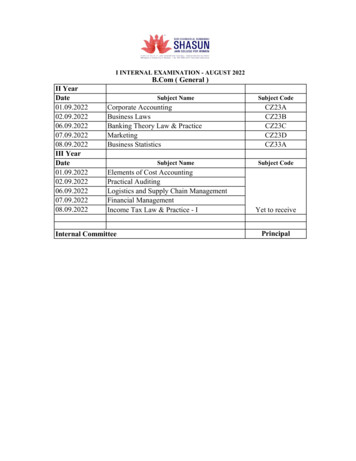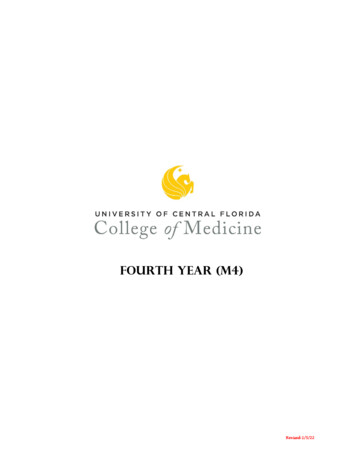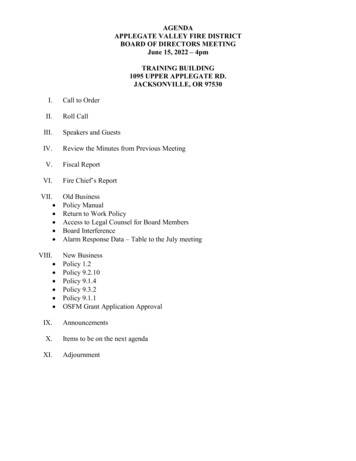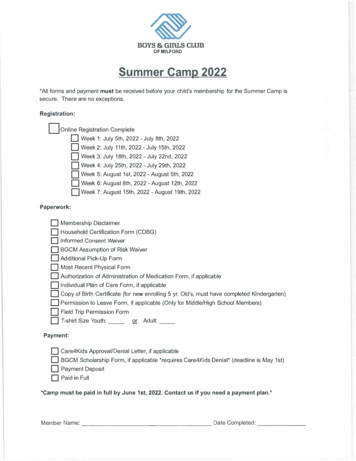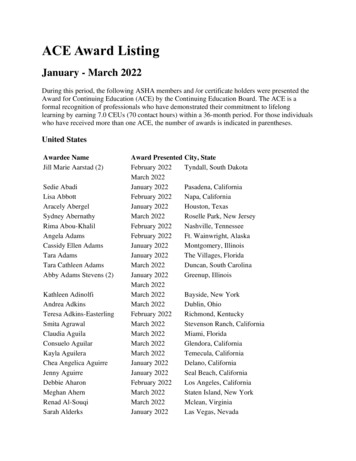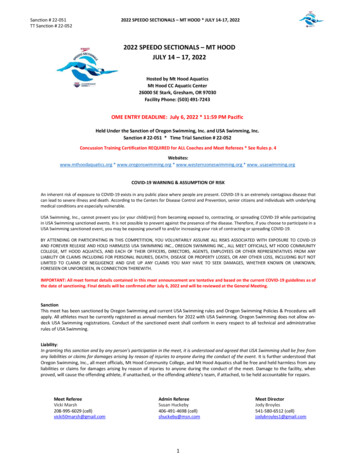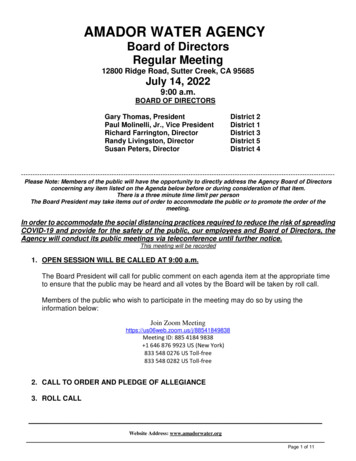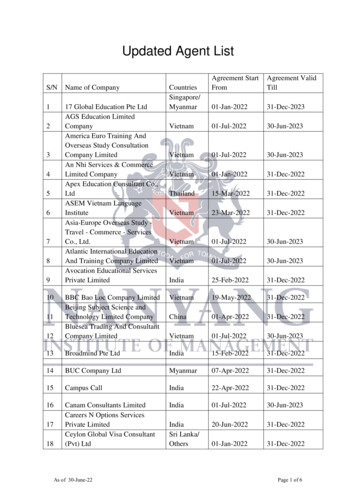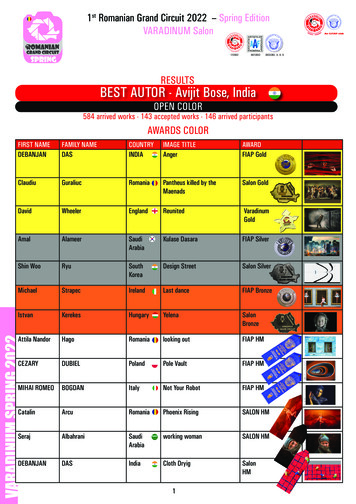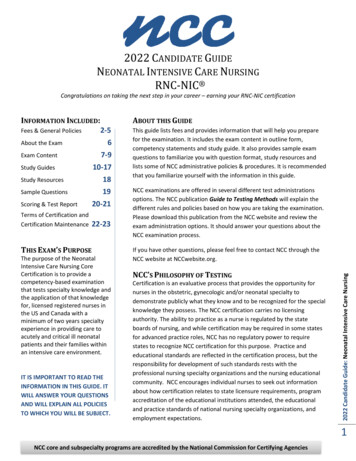
Transcription
2022 CANDIDATE GUIDENEONATAL INTENSIVE CARE NURSINGRNC-NIC Congratulations on taking the next step in your career – earning your RNC-NIC certificationABOUT THIS GUIDEAbout the Exam2-56Exam Content7-9Fees & General PoliciesStudy GuidesStudy ResourcesSample Questions10-171819Scoring & Test Report20-21Terms of Certification andCertification Maintenance22-23THIS EXAM’S PURPOSEThe purpose of the NeonatalIntensive Care Nursing CoreCertification is to provide acompetency-based examinationthat tests specialty knowledge andthe application of that knowledgefor, licensed registered nurses inthe US and Canada with aminimum of two years specialtyexperience in providing care toacutely and critical ill neonatalpatients and their families withinan intensive care environment.IT IS IMPORTANT TO READ THEINFORMATION IN THIS GUIDE. ITWILL ANSWER YOUR QUESTIONSAND WILL EXPLAIN ALL POLICIESTO WHICH YOU WILL BE SUBJECT.This guide lists fees and provides information that will help you preparefor the examination. It includes the exam content in outline form,competency statements and study guide. It also provides sample examquestions to familiarize you with question format, study resources andlists some of NCC administrative policies & procedures. It is recommendedthat you familiarize yourself with the information in this guide.NCC examinations are offered in several different test administrationsoptions. The NCC publication Guide to Testing Methods will explain thedifferent rules and policies based on how you are taking the examination.Please download this publication from the NCC website and review theexam administration options. It should answer your questions about theNCC examination process.If you have other questions, please feel free to contact NCC through theNCC website at NCCwebsite.org.NCC’S PHILOSOPHY OF TESTINGCertification is an evaluative process that provides the opportunity fornurses in the obstetric, gynecologic and/or neonatal specialty todemonstrate publicly what they know and to be recognized for the specialknowledge they possess. The NCC certification carries no licensingauthority. The ability to practice as a nurse is regulated by the stateboards of nursing, and while certification may be required in some statesfor advanced practice roles, NCC has no regulatory power to requirestates to recognize NCC certification for this purpose. Practice andeducational standards are reflected in the certification process, but theresponsibility for development of such standards rests with theprofessional nursing specialty organizations and the nursing educationalcommunity. NCC encourages individual nurses to seek out informationabout how certification relates to state licensure requirements, programaccreditation of the educational institutions attended, the educationaland practice standards of national nursing specialty organizations, andemployment expectations.2022 Candidate Guide: Neonatal Intensive Care NursingINFORMATION INCLUDED:1coreand subspecialtyprogramsareaccreditedby the NationalCertifying Agencies 2022NCCNationalCertificationCorporation (NCC)All RightsReserved 676 N MichiganAve #3600 CommissionChicago, IL 60611for 312-951-0207NCCwebsite.org
FEES & GENERAL POLICIESEXAMINATION AND RELATED FEESEXAMINATION FEES*Computer Exam Fees are 325 which includes the non-refundable 50application fee.*Examination fees are subject to change.CHANGE REQUESTCandidates who cannot take their currently scheduled examination, havemissed their testing date or need to take a different exam - can request achange for a fee of 125. Details are on the NCC website.WITHDRAWAL FEEComputer exam candidatescan change their scheduledtesting date to another datewithin their window once forfree.Candidates must handle thisdirectly with PSI/AMP.RETEST FEERetest candidates must pay full application and examination fees. There areno discounts and they must complete a 90-day wait period* beforeresubmitting an application for testing. (*see Retest Policy page 4).Certification exams of the same specialty can only be taken TWICE in acalendar year for the same candidate.SUBSTITUTION FEECandidate substitutions are not allowed for any reason.THIRD PARTY PAYMENTSApplicant fees paid by third parties will be refunded to the third party inaccordance with stated refund policies, in the event the applicant isdetermined ineligible or withdraws within the specified time.NO REFUNDS WILL BE CONSIDERED FOR ANY CANDIDATE who has taken an examination who is not successful in achieving certification who failed to take the exam via computer within the 90-day testing window and did not submita change request within stated time frames who is beyond the first 30 days of their eligibility window and is unable to schedule their exam withintheir eligibility window.2022 Candidate Guide: Neonatal Intensive Care NursingRefer to the NCC testingguide for details.A computer testing candidate who withdraws from testing is subject to a 165 withdrawal fee. The candidate will receive 160 of their 325payment, minus any outstanding charges. Bulk Purchase Vouchercandidates cannot withdraw.2 2022 National Certification Corporation (NCC) All Rights Reserved 676 N Michigan Ave #3600 Chicago, IL 60611 312-951-0207 NCCwebsite.org
FEES & GENERAL POLICIESPAYMENT INFORMATIONOTHER NON-REFUNDABLE PAYMENT RELATED FEES All applications are subject to anonrefundable application fee.INCOMPLETE APPLICATION FEE Payments can be made bycredit card (Visa, AmericanExpress and MasterCard only). Payments can be made bycheck: bank routing number andaccount number required. For payments made by thirdparties, any refund will be issuedto the third party and not to theapplicant. All payments must be in USfunds. NCC does not accept debitcards or split payments (partcheck and part credit card). Exam fees can only besubmitted online at the NCCwebsite. Applications will not beaccepted by mail, phone or fax. NCC will accept grouppayments for certification examsfrom institutions. Details are onthe NCC website.RETURNED CHECKS AND CREDIT CARD CHARGEBACK FEEA 30 fee will be assessed for any check or e-check returned or a credit cardpayment disputed for any reason. Remittance thereafter of all fees andapplications must be in the form requested by NCC.LICENSE VERIFICATIONIf licensure information is requested requiring an additional submission, thecandidate will have two weeks to provide the license with all the correctinformation and pay the non-refundable 30 reprocessing fee. If this is notprovided within the two weeks, the application will be marked ineligible.Ineligible applicants will receive a refund minus the 50.00 non-refundableapplication fee. There are no refunds or withdrawals for applications usinga bulk code.VERIFICATION OF CERTIFICATIONThird party notification of status will not be released without authorizationfrom the RNC. A 30 fee is required for any third party notification orissuance of duplicates of test results reports. Verification requests can onlybe submitted after official results with score report have been uploaded toyour NCC account.Verification requests can only be made via the online verification system onthe NCC website. NCC does not issue verifications via the mail or fax.Certification will be revoked or withheld if a returned check or achargeback request on a credit card payment results in loss ofincome to NCC and the monies are not recovered in an alternatepayment. Fees received at any time will first be applied to anyunpaid prior certification/special fees.2022 Candidate Guide: Neonatal Intensive Care Nursing All fees are nonrefundableexcept where otherwise noted.All incomplete applications are subject to a non-refundable 30reprocessing fee upon the submission of proper documentation.Incomplete applications are those submitted with missing information, (e.g.required licensure information and corroborating uploaded documentation;containing incomplete or incorrect information; or do not include full feepayment).3 2022 National Certification Corporation (NCC) All Rights Reserved 676 N Michigan Ave #3600 Chicago, IL 60611 312-951-0207 NCCwebsite.org
FEES & GENERAL POLICIESGENERAL POLICIESUNSUCCESSFUL CANDIDATESEXAM CATEGORY CHANGESA candidate who sits for theexamination and does not receive apassing score is not eligible for anyrefund nor for any credit on anylater NCC exam.You can only request an exam category change by completing a ChangeRequest Form on the NCC website and submitting with non-refundablepayment of 125. Candidates are only allowed one change option (e.g. ifyou reschedule your exam date, you will not be able to change your examcategory). All change requests must be approved by NCC. There will be norefund of original or Change Request fees. Eligibility must be re-establishedfor the new exam category, and additional documentation and fees may berequired. The time to consider eligibility for the new category will counttoward the original assigned 90-day computer testing window.Examination category cannot be changed from a subspecialty or RN Coreapplication to a NNP or WHNP certification. Examinees must take theexam for which they have been determined eligible. No changes will bepermitted on examination day. If a candidate knowingly or unknowinglytakes an examination other than the one they were found eligible to take,the examination will not be scored. No refunds will be allowed, and all feepolicies will apply if the candidate reapplies for an examination. Seewebsite for complete details.It is the policy of NCC that noindividual will be excluded fromthe examinations as a result ofage, sex, race, religion, nationalorigin, ethnicity, disability,marital status, sexualorientation, military status orgender identity.AMERICANS WITH DISABILITIESACTSpecial testing accommodationswill be provided pursuant to theAmericans with Disabilities Act.Any requests for special testingaccommodations must be madein writing and submitted with theapplication. The accommodationrequest form can be downloadedfrom the NCC website. Uponreceipt of a request for specialaccommodations, NCC willcontact the applicant. Suchrequests must be signed by aclinician, physician, or otherqualified specialist with trainingand experience appropriate todiagnose and treat the specifieddisability.RETEST POLICYYou may retake the examination if you do not pass. You must reapply,submit all applicable fees and documentation, and re-establish eligibilityaccording to the appropriate deadlines. There is no limit to the number oftimes you may retake the examination. However, the maximum number oftimes a candidate can take the same NCC test in a calendar year is two.All retest candidates must wait 90 days from the date their exam wastaken before they can submit a new application to retest. this date is provided in the candidate's results notification this 90-day wait period affects all modes of testingAny loss of power or internet during an exam in which there was more than15 minutes of testing with exposure to more than 10% of the exam requiresa retest after 90-days. There is no need to complete a new application butyou will need to notify NCC to move your eligibility window so it begins 90days after the exam attempt. Please notify NCC immediately if this occursso that a new window can be set.If a retest application is submitted prior to the 90-day wait period, theapplication will be returned as ineligible. The applicant will be subject tothe 50 non-refundable application fee.2022 Candidate Guide: Neonatal Intensive Care NursingNONDISCRIMINATION4 2022 National Certification Corporation (NCC) All Rights Reserved 676 N Michigan Ave #3600 Chicago, IL 60611 312-951-0207 NCCwebsite.org
FEES & GENERAL POLICIESNCC does not offer or sponsorreview courses or reviewmaterials for its certificationexaminations. Examinationcandidates should view anycourse of study as beingindependent of NCC. You shouldcarefully examine the merits ofany individual exam preparationoffering before you participate.TEST DISCLOSURENCC does not make testquestions available for review.Because test questions may beused for more than oneexamination administration,distributing this informationwould compromise the securityof the test questions and wouldincrease the cost of certificationif the questions had to bereplaced each year.REVOCATIONYour certification may berevoked for falsifying anyinformation submitted todetermine eligibility to take thecertification examination or formaintaining certification, forlosing your license to practicenursing, or for failing to paydesignated certification ormaintenance fees.POLICIES ARE SUBJECTTO CHANGEGENERAL POLICIES (CONTINUED)INTERNET DISCONNECTIONSIf you start the exam and are disconnected, please use the PSI tech lines ifyou are testing with LRP or if at a test center please discuss with theproctor to attempt to get reconnected and continue testing.If you are unable to get reconnected after starting the exam, the timing fora second attempt to take the exam will be based on how much time andhow many questions you were exposed to. If you are disconnected andcannot be reconnected and have tested for under 15 minutes and wereexposed to less than 10% of the exam you will be rescheduled within yourcurrent eligibility window. You must work directly with PSI that day toreschedule and if you run into any issues you must notify NCC within 3days of testing. If you tested for longer than 15 minutes and/or saw morethan 10% of the questions on the exam you will have to wait 90 days andwill be rescheduled. A decision on the timing of your second attempt will bemade after reviewing the test exposure. Please note, you will need to retestat a computer center. Please notify NCC of the internet disconnection issueas soon as you have convenient computer access.APPEALS PROCEDUREAny request to waive any policy of the NCC Board of Directors relative toeligibility, administration, examination content issues, or certificationmaintenance must be received in writing within 60 days of the dispute. Allrequests should be sent to the attention of the NCC President atnccpresident@nccnet.org. The correspondence should contain a detailedaccount as to why the NCC policy should be waived or the candidate’sstatus should be changed. Such requests are referred to the NCC PolicyReview Committee of the Board of Directors. All decisions will be providedin writing. Cases not resolved by the Policy Review Committee will bereferred to the full Board of Directors.DESIGNATION AUTHORIZATIONCertification is a non-transferable, revocable, limited, non-exclusive licenseto use the certification designation “RNC-NIC ”, subject to compliance withthe policies and procedures, as may be revised from time to time.Any use or display of NCC certification marks and/or logos without the priorwritten permission of the NCC is prohibited. Any candidate or certificantwho manufacturers, modifies, reproduces, distributes or uses a fraudulentor otherwise unauthorized NCC certificate, NCC designation or othercredential may be subject to disciplinary action, including denial orrevocation of eligibility or certification. Any individual who engages in suchbehavior also may be subject to legal action.WITHOUT NOTICE. 2022 National Certification Corporation (NCC) All Rights Reserved 676 N Michigan Ave #3600 Chicago, IL 60611 312-951-0207 NCCwebsite.org2022 Candidate Guide: Neonatal Intensive Care NursingREVIEW COURSES ANDMATERIALS5
ABOUT THE EXAMABOUT THE EXAMEXAMINATION CONTENT DEVELOPMENTTIMED EXAMINATIONThree (3) hours are allotted tocomplete the examination.The development of NCC certification involves many individuals andinvolves a meticulous process of review. There are three major groupsthat contribute to the test development process:EXAM FORMATITEM WRITERS:The Neonatal Intensive CareNursing examination consists ofup to 175 test questions. 150 arescored and the remainder areembedded in the exam as pretestitems. The pretest items do notcount toward the examinee’s finalresults.RNCs and others identified with special expertise have the responsibilityof drafting test items per designated assignment for review by the contentteam and expert reviewers. Item writers are solicited from the NCCcertified population, by recommendations or through the volunteerportal.used for all NCC examinations.- Each question has a premise(stem) and three alternativeanswers.- The answer options arealphabetized by the first word ineach answer option torandomize the answers.- Computer tests are delivered ina different random order foreach candidate.- Questions will test both basicknowledge and application ofknowledge.- Questions that containlaboratory data will show resultsin conventional units of measurewith international units inparentheses.- Drugs are listed in both genericReviewers are RNCs or other designated experts who assist the contentteams in review of test items developed by the item writers. Reviewersare responsible for reviewing items for content relevance and confirmingthat references cited for the questions support the items as written.CONTENT TEAMS:Content team members are experienced practitioners and are appointedon an annual basis by the NCC President. Content teams are solicitedfrom the NCC certified population, by recommendations or through thevolunteer portal. To see the current membership composition of theContent Team responsible for the Neonatal Intensive Care Nursingexamination, please visit the NCC website under the section on NCCLeadership.Content team members are RNCs or other identified experts who:- develop and update the test outline and competency statements- review test items developed by item writers- review item statistics from exam administrations and pretestexaminations- approve the exam forms to be administered- review item banksIn addition, NCC uses volunteers for standard setting and contentvalidation studies.and trade names whereappropriate.2022 Candidate Guide: Neonatal Intensive Care Nursing- There is one question formatREVIEWERS:6 2022 National Certification Corporation (NCC) All Rights Reserved 676 N Michigan Ave #3600 Chicago, IL 60611 312-951-0207 NCCwebsite.org
EXAMINATION CONTENTNeonatal Intensive Care Nursing examPercentage of Questions in Content Categories44%General Management39%Assess & ManagePathophysiologic States5%Psychosocial Support3%Professional IssuesThe above chart shows the percentage distribution of questions on the Neonatal Intensive Care Nursing exam acrossthe major content categories covered on the examination. The major focus of the examination is on GeneralManagement and Assess & Manage Pathophysiologic States. Lesser emphasis is on General Assessment andPsychosocial Support with Professional Issues having the least number of questions assigned to this content category2022 Candidate Guide: Neonatal Intensive Care Nursing9%General Assessment7 2022 National Certification Corporation (NCC) All Rights Reserved 676 N Michigan Ave #3600 Chicago, IL 60611 312-951-0207 NCCwebsite.org
EXAMINATION CONTENTEXAM OUTLINEThis is an outline of topics andareas which may be included inthe Neonatal Intensive CareNursing examination10.00 General Assessment (9%)Maternal Risk Factors and Birth HistoryPhysical and Gestational Age Assessment11.00 General Management (44%)Resuscitation and StabilizationFluids and Electrolytes and Glucose HomeostasisNutrition and FeedingOxygenation, Ventilation and Acid Base HomeostasisThermoregulation and IntegumentaryPharmacology, Pharmacokinetics and PharmacodynamicsNeuroprotective and Neurodevelopmental CareInfection and Immunology13.00 Psychosocial Support (5%)Discharge Management, Family Centered Care, Grieving, PalliativeCare, Mental Health14.00 Professional Issues (3%)including: Evidence Based Practice, Legal/Ethical, Patient Safety,Quality Improvement2022 Candidate Guide: Neonatal Intensive Care Nursing12.00 Assess & Manage Pathophysiologic States (39%)CardiovascularRespiratoryGastrointestinal and arGenetic, Metabolic and EndocrineHead, Eye, Ear, Nose Throat8 2022 National Certification Corporation (NCC) All Rights Reserved 676 N Michigan Ave #3600 Chicago, IL 60611 312-951-0207 NCCwebsite.org
EXAMINATION CONTENTASSOCIATED COMPETENCIES 2022 Candidate Guide: Neonatal Intensive Care Nursing Identify antepartal and intrapartal indicators of neonatal risk and their potential significanceSystematically assess all body systems utilizing physical examination, gestational age assessment andneurobehavioral assessmentApply knowledge of anatomy and physiology (maternal, fetal, transitional, newborn), pathophysiology,pharmacology, nutrition, and behavioral psychology to assess the neonate and differentiate abnormal fromnormalRecognize normal values and deviations in clinical laboratory and diagnostic data and identify potentialsignificanceUtilize biophysical monitoring techniques to identify body system alterationsDevelop an individualized plan of care for the restoration, maintenance and promotion of health for the highrisk neonate and family unit during hospitalization and following dischargeImplement diagnostic, therapeutic and educational plans in collaboration with other health care providers toprovide direct care for the high risk neonate and familyAssess the neonate's family, community and environment to identify areas of riskIdentify life-threatening states and initiate appropriate interventionsEvaluate the plan of care in collaboration with other health care providers and the family and modify the planof care as indicatedIdentify professional nursing issues which impact on the role of the neonatal nurse9 2022 National Certification Corporation (NCC) All Rights Reserved 676 N Michigan Ave #3600 Chicago, IL 60611 312-951-0207 NCCwebsite.org
STUDY GUIDEGENERAL ASSESSMENT Problems associated with amniotic fluid andmembranes- amniotic bands- oligohydramnios- polyhydramnios- PROM and chorioamnionitis Significance of findings:- alpha-fetoprotein/triple quad/screen- biophysical profile- diagnostic ultrasound Recognize neonatal significance of fetal heart ratepatterns- altered variability- decelerationsearly, late, variable- tachycardia, bradycardia Effects of maternal medications on the neonate- tocolytics- analgesia, anesthesiaII. Physical and Gestational Age Assessment Interpretation of growth curves- weight, length and head circumference Physical and neuromuscular characteristics- preterm- term- post-term- AGA- SGA- LGA Associated risks with- Preterm- post-term- SGA/IUGR- LGA Normal/abnormal findings regarding:- general appearance- head, eyes, ears, nose & throat- neck- chest- cardiovascular- respiratory- abdomen- genitalia- extremities- spine/back- skin- maintaining skin integrity- neuromuscular and reflexes Problems in labor - impact on the neonate- breech and other malpresentation- maternal hemorrhage- meconium Obstetric emergencies (impact on the neonate)- abruptio placenta- cord prolapse- placenta previa Impact of methods of delivery on the neonate- forceps, vacuum, cesarean2022 Candidate Guide: Neonatal Intensive Care NursingI. Maternal Risk Factors and Birth History Effects of maternal medical complications- hematologicthrombocytopenia- hypertensionchronic, gestational hypertension, HELLPSyndrome- infectionsCMV, Toxoplasmosis, syphilis, herpes, hepatitis,HIV, gonorrhea, chlamydia- renal disease10 2022 National Certification Corporation (NCC) All Rights Reserved 676 N Michigan Ave #3600 Chicago, IL 60611 312-951-0207 NCCwebsite.org
STUDY GUIDEGENERAL MANAGEMENTI. Resuscitation and StabilizationIII. Nutrition and Feeding Neonatal Cardiopulmonary Resuscitation(Per the American Heart Association & theAmerican Academy of Pediatrics)- initial evaluation (ABC)- indications for ventilation- indications for intubation- indications for cardiac compressions- medications Nutritional requirements and effects of excess & deficiency- calories- carbohydrates- fat- minerals- protein- vitamins Resuscitation and stabilization of the neonate with- diaphragmatic hernia- hydrops fetalis- perinatal asphyxia- upper airway obstructionII. Fluids and Electrolytes and Glucose Homeostasis Normal fluid and electrolyte requirements Monitoring fluid and electrolyte status- electrolytes- urine output Effects of- humidity- maturity- temperature Specific problems- dehydration and overhydration- gastrointestinal abnormalities- insensible water loss- patent ductus arteriosus- post-asphyxia- third spacing Parenteral fluid therapy gavage feeding bolus vs continuous feedings feeding cues feeding techniques bottle feeding- formula composition breast feeding- stimulating production- composition of breast milk- donor milk Parenteral nutrition- indications- composition- complications Dietary supplements- breast milk fortifiers- glucose polymers- iron- MCT- Vitamins- probiotics Nutritional management for- bronchopulmonary dysplasia- prematurity- short gut syndromeshort gut syndrome2022 Candidate Guide: Neonatal Intensive Care Nursing Use of drugs- epinephrine- volume expanders Enteral feeding- minimal enteral feedings (gut priming)11 2022 National Certification Corporation (NCC) All Rights Reserved 676 N Michigan Ave #3600 Chicago, IL 60611 312-951-0207 NCCwebsite.org
STUDY GUIDE Oxygenation: interpretation and management- hypoxia/hypoxemia- oxygen saturation- principles re: increasing/ decreasing FiO2 levels- pulse oximeter Methods of oxygenation/ ventilation- indications, complications- noninvasive ventilation- extracorporeal membrane oxygenation (ECMO)- high flow nasal cannula Mechanical ventilation- conventional- high frequency- other methods of oxygen delivery (hood, nasalcannula) Blood gases: interpretation and management- metabolic acidosis (compensated &uncompensated)- metabolic alkalosis (compensated &uncompensated)- respiratory acidosis (compensated &uncompensated)- respiratory alkalosis (compensated &uncompensated)- mixed- serum lactateV. Thermoregulation and Integumentary Mechanisms of heat loss and production- assessment of thermal state- responses to hypothermia and cold stress- responses to hyperthermia Equipment- Incubators and radiant warmers- Heat mattresses and wraps Skin CareVI. Pharmacology, Pharmacokinetics andPharmacodynamics Principles of neonatal pharmacology- administration methods/issues- absorption from GI tract, skin and muscle- blood drug levels (toxic vs therapeutic)- drug distribution in the body- drug excretion- drug incompatibilities- drug withdrawal (therapeutic drugs)- drug resistance Dosage calculations Common drugs- anesthetics and analgesia (sedatives)- antibiotics- anticonvulsants- antiviral drugs- bronchodilators- cardiovascular agents- CNS stimulants (caffeine, etc)- Diuretics- muscle relaxants Management of the drug exposed neonate- Fetal alcohol syndrome- Neonatal abstinence syndrome and scoring- Substance use and abuse Laboratory drug testing Maintaining a neutral thermal environment Management of thermoregulation problems- evaporation- conduction- convection- radiation- hypothermia and cold stress- hyperthermia 2022 National Certification Corporation (NCC) All Rights Reserved 676 N Michigan Ave #3600 Chicago, IL 60611 312-951-0207 NCCwebsite.org2022 Candidate Guide: Neonatal Intensive Care NursingIV. Oxygenation, Ventilation and Acid BaseHomeostasis12
STUDY GUIDEVII. Neuroprotective and Neurodevelopmental CareVIII. Infection and Immunology Neurobehavioral development- Habituation- motor organization- state organization- sensory/interaction capabilities Interpret laboratory values- WBC and differential- cerebrospinal fluid Impact of the NICU environment- physical- light- sound- social- caregiver-infants interactions- patterns of caregiving Intervention strategies- reducing noise levels- reducing light levels/diurnal patterns- altering care patterns- handling/positioning- kangaroo care/skin-to-skin- nonnutritive sucking Neonatal sepsis/meningitis Viral and fungal infectionscandidiasiscytomegalovirushepatitis BherpesHIV/AIDStoxoplasmosisvaricella Specific bacterial infections such asE coli infectionGroup B Streptococcal infectionEarly/late onsetstaphylococcal infectionsyphilisenterovirus Infection control proceduresnosocomial infection Provision of sensory experiences- auditory- tactile- visual- vestibular and proprioceptive Pain- assessment- non-pharmacologic interventions2022 Candidate Guide: Neonatal Intensive Care Nursing Self regulatory (stability) and stress responses- autonomic- motoric- state/sleep cycles- attentional Immature host defenses13 2022 National Certification Corporation (NCC) All Rights Reserved 676 N Michigan Ave #3600 Chicago, IL 60611 312-951-0207 NCCwebsite.org
STUDY GUIDEASSESS AND MANAGE PATHOPHYSIOLOGIC STATES Cyanosiscentral vs peripheralcardiac vs pulmonary Specific ProblemsFor all problems: presentation/ assessment causes,management, complications, outcomearrhythmiascardiac tamponadecongestive heart failurecongenital heart defectsAV canalcoarctation of the aortahypoplastic left heartpulmonary stenosis and atresiatetralogy of fallottransposition of the great vesselstotal anomalous pulmonary venous returnventricular septal defectcyanotic vs acyanotic diseasehypertensionpatent ductus arteriosusshock Cardiovascular assessmentblood pressureEKGcardiopulmonary monitoringindwelling linesII. Respiratory Normal pulmonary function, surfactant Specific respiratory problemsFor all problems: presentation/ assessment causes,management, complications, outcomeapnea of prematuritybronchopulmonary dysplasiadiaphragmatic hernia/paralysishypoplastic lungsmeconium aspirationpersistent pulmonary hypertensionpneumothorax/air leakspulmonary hemorrhagerespiratory distress syndrometransient tachypnea of the newborn Specific therapiesFor all problems: p
candidate will have two weeks to provide the license with all the correct information and pay the non-refundable 30 reprocessing fee. If this is not provided within the two weeks, the application will be marked ineligible. Ineligible applicants will receive a refund minus the 50.00 non-refundable application fee.
